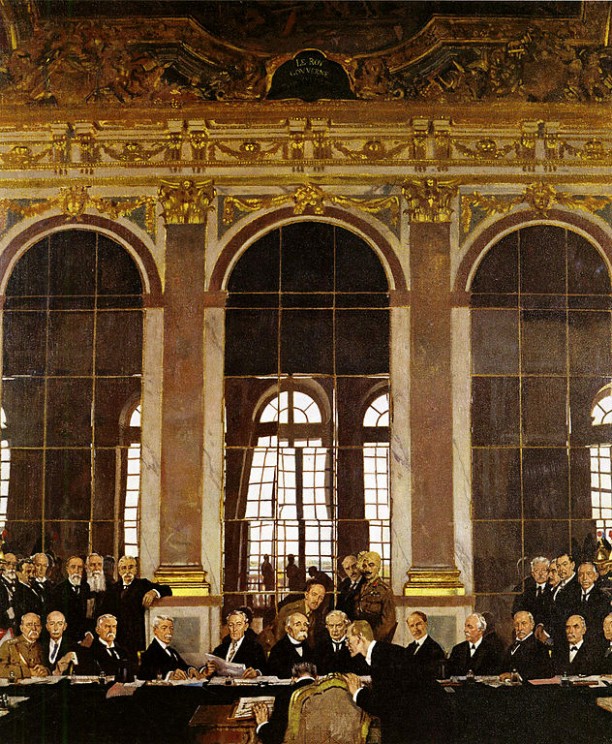On 28 June 1914, Archduke Franz Ferdinand and his wife Sophie, Duchess of Hohenberg, were assassinated in Sarajevo, setting off a six week diplomatic battle that resulted in the start of the First World War. The horrors of that war, from chemical weapons to civilian casualties, led to the first forays into modern international law. The League of Nations was established to prevent future international crises and a Permanent Court of International Justice created to settle disputes between nations. While these measures did not prevent the Second World War, this vision of a common law for all humanity was essential for international law today. To mark the centenary of the start of the Great War, and to better understand how international law arose from it, we’ve compiled a brief reading list.
The Oxford Handbook of the History of International Law, Edited by Bardo Fassbender, Anne Peters, and Simone Peter
How did international law develop from the 15th century until the end of World War II? This 2014 ASIL Certificate of Merit winnor looks at the history of international law in relation to themes such as peace and war, the sovereignty of states, hegemony, and the protection of the individual person. It includes Milos Vec’s ‘From the Congress of Vienna to the Paris Peace Treaties of 1919′ and Peter Krüger’s ‘From the Paris Peace Treaties to the End of the Second World War’.
Formalizing Displacement: International Law and Population Transfers by Umut Özsu
A detailed study into the 1922-34 exchange of minorities between Greece and Turkey, supported by the League of Nations, in which two million people were forcibly relocated. Check out the specific chapters on: Wilson and international law; US jurisprudence and international law in the wake of WWI; and the failed marriage of the US and the League of Nations and America’s reaction of isolationism through WWII.
The Birth of the New Justice: The Internationalization of Crime and Punishment, 1919-1950 by Mark Lewis
How could the world repress aggressive war, war crimes, terrorism, and genocide in the wake of the First World War? Mark Lewis examines attempts to create specific criminal justice courts to address these crimes, and the competing ideologies behind them.
A History of Public Law in Germany 1914-1945 by Michael Stolleis, Translated by Thomas Dunlap
How did the upheaval of the first half of the 20th century impact the creation of public law within and across states? Germany offers an interesting case given its central role in many of the events.
“Neutrality and Multilateralism after the First World War” by Aoife O’ Donoghue in the Journal of Conflict and Security Law
What exactly did ‘neutrality’ mean before, during, and after the First World War? The newly independent Ireland exemplified many of the debates surrounding neutrality and multilateralism.

“What is Aggression? : Comparing the Jus ad Bellum and the ICC Statute” by Mary Ellen O’Connell and Mirakmal Niyazmatov in the Journal of International Criminal Justice
The Treaty of Versailles marked the first significant attempt to hold an individual — Kaiser Wilhelm — accountable for unlawful resort to major military force. Mary Ellen O’Connell and Mirakmal Niyazmatov discuss the prohibition on aggression, the Jus ad Bellum, the ICC Statute, successful prosecution, Kampala compromise, and protecting the right to life of millions of people.
“Delegitimizing Aggression: First Steps and False Starts after the First World War” by Kirsten Sellars in the Journal of International Criminal Justice
Following the First World war, there was a general movement in international law towards the prohibition of aggressive war. So why is there an absence of legal milestones marking the advance towards the criminalization of aggression?
“The International Criminal Tribunal for the Former Yugoslavia: The Third Wang Tieya Lecture” by Mohamed Shahabuddeen in the Chinese Journal of International Law
What is the bridge between the International Military Tribunal, formed following the Treaty of Versailles, and the International Criminal Tribunal for the former Yugoslavia? Mohamed Shahabuddeen examines the first traces of the development of international criminal justice before the First World War and today’s ideas of the responsibility of the State and the criminal liability of the individual.
“Collective Security, Demilitarization and ‘Pariah’ States” by David J. Bederman in the European Journal of International Law
When are sanctions doomed to failure? David J. Bederman analyzes the historical context of the demilitarization sanctions imposed against Iraq in the aftermath of the Gulf War of 1991 from the 1919 Treaty of Versailles through to the present day.
“Peace Treaties after World War I” by Randall Lesaffer, Mieke van der Linde in the Max Planck Encyclopedia of Public International Law
How did legal terminology and provisions concerning hostilities, prisoners of war, and other wartime-related concerns change following the introduction of modern warfare during the First World War?
“League of Nations” by Christian J Tams in the Max Planck Encyclopedia of Public International Law
What lessons does the first body of international law hold for the United Nations and individual nations today?
“Alliances” by Louise Fawcett in the Max Planck Encyclopedia of Public International Law
Peace was once ensured through a complex web of diplomatic alliances. However, those same alliances proved fatal as they ensured that various European nations and their empires were dragged into war. How did the nature of alliances between nations change following the Great War?
“International Congress of Women (1915)” by Freya Baetens in the Max Planck Encyclopedia of Public International Law
In the midst of tremendous suffering and loss, suffragists continued to march and protest for the rights of women. How did the First World War hinder the women’s suffrage movement, and how did it change many of the demands and priorities of the suffragists?
“History of International Law, World War I to World War II” by Martti Koskenniemi in the Max Planck Encyclopedia of Public International Law
A brief overview of the development of international law during the interwar period: where there was promise, and where there was failure.
Headline image credit: Stanley Bruce chairing the League of Nations Council in 1936. Joachim von Ribbentrop is addressing the council. Bruce Collection, National Archives of Australia. Public domain via Wikimedia Commons.
The post The First World War and the development of international law appeared first on OUPblog.



